Did you know that Diosdado Macapagal, the 9th President of the Philippines, played a pivotal role in shaping the nation’s history? From his humble beginnings to his significant contributions as president, Macapagal had a lasting impact on Philippine society and politics. Let’s delve into the life and accomplishments of this influential leader.
Key Takeaways:
- Diosdado Macapagal served as the 9th President of the Philippines from 1961 to 1965.
- Despite facing financial hardships, Macapagal excelled academically and embarked on a career in public service.
- He implemented significant economic and social reforms during his presidency, including land reform and the shift of Independence Day.
- Macapagal prioritized tackling graft and corruption, promoting transparency in government.
- He played a crucial role in enhancing foreign relations and diplomacy for the Philippines.
Early Years of Diosdado Macapagal
Diosdado Macapagal, the 9th President of the Philippines, had a humble beginning in the town of Lubao, Pampanga. Born on September 28, 1910, he grew up in a modest family that faced financial hardships. Despite these challenges, Macapagal displayed remarkable academic excellence throughout his early years.
Lubao, located in the province of Pampanga, served as the backdrop of Macapagal’s formative years. This small town, known for its rich cultural heritage, played a significant role in shaping his upbringing and values.
Macapagal’s pursuit of academic excellence was fueled by his determination to overcome his family’s financial struggles. He demonstrated exceptional intelligence and dedication, excelling in his studies despite limited resources. His dedication to learning laid the foundation for his future accomplishments.
Moreover, Macapagal’s family and ancestry had a profound influence on his character and aspirations. He hailed from a lineage of educators and freedom fighters, instilling in him a sense of duty and a strong commitment to public service. The values instilled by his family played a crucial role in his political career.
Overall, the early years of Diosdado Macapagal in Lubao, Pampanga, set the stage for his journey towards becoming one of the most influential figures in Philippine history. His humble beginnings, academic excellence, and family influence shaped his character and propelled him towards a path of leadership and service to the nation.
The Path to Politics
After completing his law studies, Diosdado Macapagal embarked on a remarkable journey into the world of public service. Transitioning from the legal field to politics, he began his career under the guidance of Manuel L. Quezon, a prominent political figure in the Philippines at the time.
Transition from Law to Public Service
Macapagal’s decision to transition from law to public service was driven by his desire to make a positive impact on society. Armed with his legal knowledge and a strong sense of justice, he sought to address the issues plaguing his country and promote the welfare of its citizens.
By choosing the path of public service, Macapagal recognized the opportunity to effect meaningful change on a larger scale. He understood that the challenges faced by the nation required not only legal expertise but also leadership and a deep understanding of the complexities of governance.
First Steps in Government under Manuel L. Quezon
Under the mentorship of Manuel L. Quezon, Macapagal took his first steps into the realm of government. Quezon, the President of the Philippines at the time, provided Macapagal with invaluable guidance and opportunities to contribute to the nation’s development.
Working closely with Quezon, Macapagal gained firsthand experience in the intricacies of governance and participated in the formulation and implementation of policies that shaped the country’s future. This early exposure to government processes and decision-making proved instrumental in Macapagal’s growth as a political leader.
World War II: Between Diplomacy and Resistance
However, Macapagal’s political aspirations were put to the test during World War II. The Japanese occupation presented him with a difficult choice: to pursue a diplomatic approach or join the resistance movement against the invaders.
In a morally challenging and politically volatile environment, Macapagal found himself torn between the principles of diplomacy and the call to resist an oppressive regime. His decision to actively participate in resistance efforts demonstrated his commitment to fighting for freedom and the welfare of his fellow Filipinos.
Throughout the war, Macapagal’s experiences shaped his understanding of the complexities and sacrifices required in the pursuit of a just and independent nation. These formative years would leave an indelible impact on his political beliefs and fervor for driving positive change.
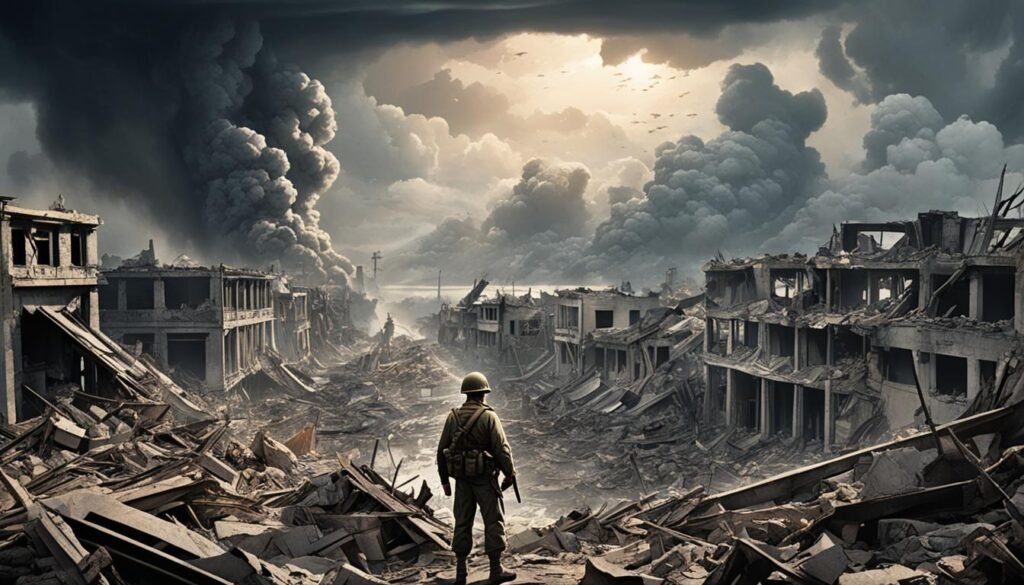
| Key Points | Details |
|---|---|
| Transition | Macapagal transitioned from law to public service to make a positive impact on society. |
| Mentorship | Under the guidance of Manuel L. Quezon, Macapagal gained valuable experience in government. |
| World War II | Macapagal faced the challenge of choosing between diplomatic efforts and resistance against the Japanese occupation. |
Diosdado Macapagal’s Legislative Career
Diosdado Macapagal’s political career began with his election to the House of Representatives. He won a seat representing the 1st District of Pampanga, where he dedicated himself to serving his constituents and pushing for legislative reforms.
Winning a Seat in the House of Representatives
After a successful political campaign, Diosdado Macapagal secured a seat in the House of Representatives, representing the 1st District of Pampanga. This achievement marked the beginning of his legislative career, where he would actively contribute to the governance and development of the Philippines.
Re-elections and Continued Advocacy
Maintaining the trust and support of his constituents, Diosdado Macapagal continued to be re-elected to the House of Representatives in subsequent elections. His commitment to the welfare of the Filipino people and his passion for advocacy remained steadfast throughout his tenure. Macapagal consistently pushed for legislative reforms, addressing crucial issues and championing causes that benefited the nation at large.
Ascension to the Vice Presidency
Diosdado Macapagal’s political journey reached new heights when he assumed the role of Vice President of the Philippines. Serving under President Carlos P. Garcia, Macapagal played a significant role in shaping the nation’s policies and direction. His expertise and dedication to public service propelled him to this esteemed position, where he worked tirelessly to address the pressing needs of the country.
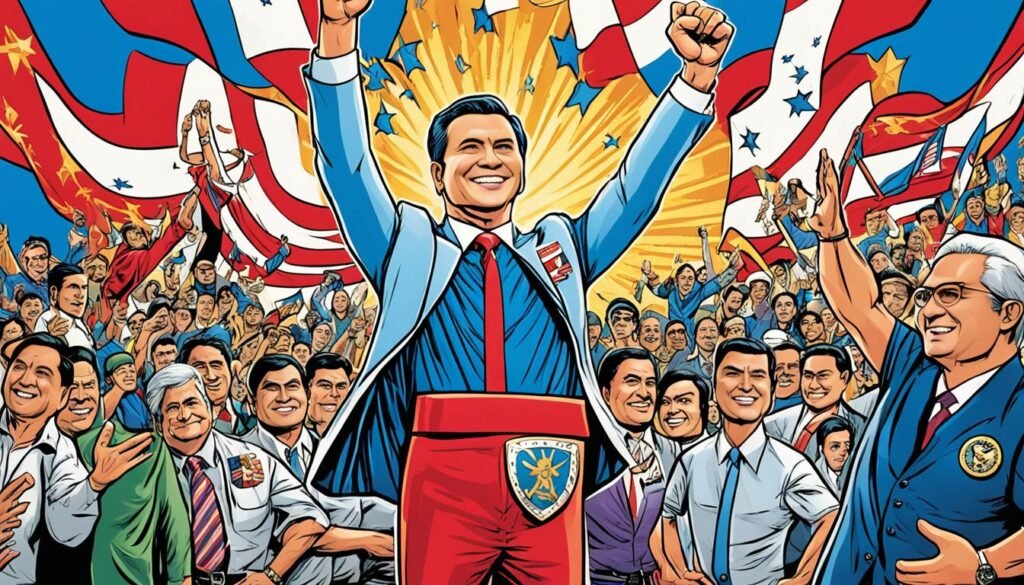
“I am committed to serving the Filipino people and advancing the interests of our great nation. As Vice President, I will strive to create positive change, promote unity, and champion the rights of every Filipino.” – Diosdado Macapagal
During his tenure as Vice President, Macapagal focused on various aspects of governance, including economic development, social welfare, and foreign relations. With his keen insight and strategic approach, he initiated and supported initiatives that aimed to uplift the lives of the Filipino people and secure a brighter future for the nation.
Macapagal’s ascension to the Vice Presidency marked a significant milestone in his political career, paving the way for his eventual rise to the highest office in the land. His experience and contributions during this crucial period laid the foundation for the transformative leadership he would exhibit as the 9th President of the Philippines.
| Key Accomplishments as Vice President | Impact on Policy and Governance |
|---|---|
| Advocated for economic reforms to stimulate growth and address poverty | Contributed to the formulation of policies that fostered economic stability and development |
| Promoted social welfare programs to improve the lives of marginalized sectors | Advanced a more inclusive and compassionate approach to governance |
| Strengthened diplomatic relations with foreign countries | Enhanced the Philippines’ standing in the international community |
Macapagal’s commitment to serving the Filipino people was evident throughout his Vice Presidency, as he worked tirelessly to address the nation’s pressing issues. Through his leadership and dedication, he set the stage for the transformative presidency that would follow, leaving an indelible mark on the Philippines’ political landscape.
Presidential Elections of 1961
In the presidential elections of 1961, Diosdado Macapagal ran against incumbent Carlos P. Garcia and emerged as the victor. His campaign focused on progressive ideals and bringing about positive change for the country.
Major Accomplishments as President
During his presidency, Diosdado Macapagal implemented several major reforms that had a significant impact on the Philippines. These accomplishments included:
Introducing Economic Reforms
Macapagal implemented various economic policies aimed at stimulating growth and development in the country. His reforms focused on promoting industrialization, attracting foreign investments, and diversifying the Philippine economy. These measures helped lay the foundation for sustained economic progress and positioned the Philippines as one of the emerging economies in Southeast Asia.
Implementing Land Reform
In an effort to address social inequality and alleviate poverty, Macapagal initiated significant land reform programs. His administration implemented measures to distribute land to landless farmers, aiming to provide them with a means of livelihood and improve their economic conditions. These land reforms sought to create a more equitable society by empowering farmers and reducing the concentration of land ownership among the elite.
Independence Day Shift from July 4 to June 12
One of the historic decisions made by Macapagal during his presidency was the shift of the Philippines’ Independence Day celebration from July 4 to June 12. This change symbolized the country’s true independence and highlighted the significance of the Philippine Revolution against Spanish colonization. The new date, June 12, commemorates the proclamation of Philippine independence in 1898. This shift further emphasized the Filipino people’s struggle for freedom and self-determination.
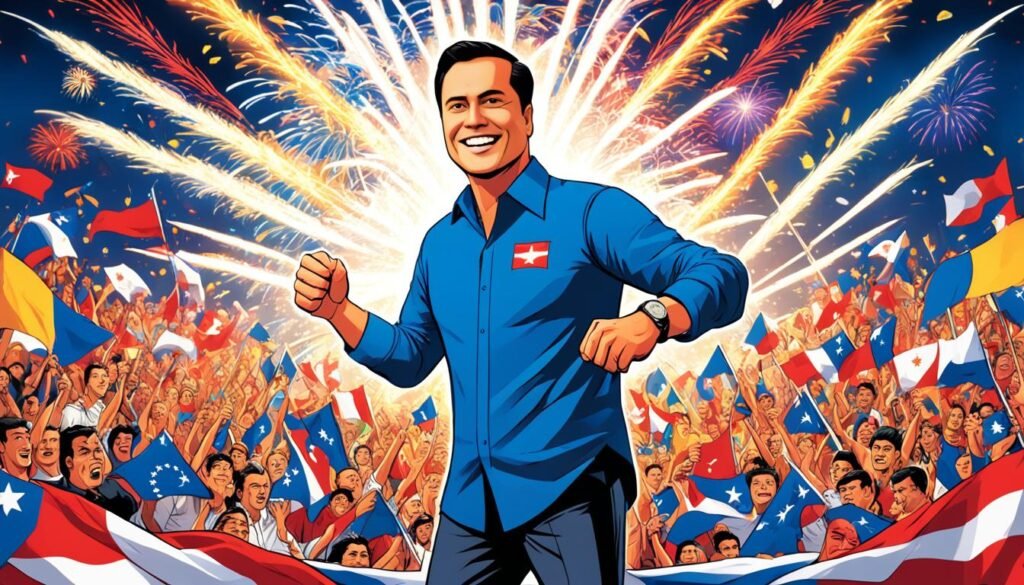
| Major Accomplishments | Description |
|---|---|
| Introducing Economic Reforms | Policies aimed at stimulating growth and development, attracting foreign investments, and diversifying the economy. |
| Implementing Land Reform | Initiatives to distribute land to landless farmers, reducing social inequality and empowering the agricultural sector. |
| Independence Day Shift | Historic decision to celebrate Philippine Independence on June 12, marking the proclamation of independence in 1898. |
Tackling Graft and Corruption
During his presidency, Diosdado Macapagal made the eradication of graft and corruption a top priority. Recognizing the detrimental effects of corruption on the nation’s progress and development, he implemented various measures to combat this pervasive issue and promote transparency in government.
Macapagal’s administration established stringent anti-corruption policies and implemented rigorous systems of accountability. He aimed to create an environment where public officials were held to the highest ethical standards and corruption was swiftly and decisively addressed.
One of Macapagal’s notable initiatives was the establishment of the Presidential Complaint and Action Center (PCAC). This office served as a platform for citizens to report corrupt practices and seek redress for their grievances. The PCAC acted as a catalyst for change, empowering individuals to play an active role in fighting corruption and promoting good governance.
Furthermore, Macapagal pushed for the passage of laws that strengthened anti-corruption mechanisms and enhanced the government’s capacity to investigate and prosecute corrupt officials. These measures aimed to instill a culture of integrity and accountability within the public sector, setting the foundation for a more transparent and ethical government.
The battle against corruption was not an easy one, as entrenched interests and deep-seated practices posed significant challenges. However, Macapagal’s unwavering commitment to eradicating graft and corruption helped lay the groundwork for successive administrations to build upon and continue the fight against this systemic issue.
Macapagal’s efforts to tackle graft and corruption left a lasting impact on Philippine governance. His proactive approach and commitment to transparency set a precedent for future leaders to follow in the pursuit of a more accountable and corruption-free society.
| Measures to Tackle Graft and Corruption | Impact |
|---|---|
| Establishment of the Presidential Complaint and Action Center (PCAC) | Empowered citizens to report corruption and seek redress |
| Passage of laws strengthening anti-corruption mechanisms | Enhanced government’s capacity to investigate and prosecute corrupt officials |
| Promotion of integrity and accountability in the public sector | Created a culture of transparency within the government |
Foreign Relations and Diplomacy
Diosdado Macapagal, as the President of the Philippines, recognized the significance of strong foreign relations and effective diplomacy. He understood that fostering positive relationships with other nations and participating actively on the global stage were crucial for the country’s growth and development.
Macapagal engaged in diplomatic efforts to strengthen ties with various countries around the world. Through diplomatic visits, bilateral agreements, and international conferences, he sought to promote the interests of the Philippines and establish mutually beneficial partnerships.
One of Macapagal’s notable achievements in foreign relations was his handling of the territorial dispute over Sabah (North Borneo), which involved the Philippines, Malaysia, and the United Kingdom. He skillfully navigated the issue and pursued peaceful negotiations to protect the country’s territorial integrity.
An influential advocate of decolonization, Macapagal played a vital role in forging closer relations with newly independent nations in Africa and Asia. He actively supported their struggles for independence, solidifying the Philippines’ position as an ally in the international community.
“Our diplomacy must be marked by keeping freedom, justice, and independence ever before us as fundamentals.”
Macapagal’s commitment to diplomacy extended beyond bilateral relations. He actively participated in regional initiatives and international organizations such as the United Nations, Association of Southeast Asian Nations (ASEAN), and the Non-Aligned Movement. Through his involvement, he emphasized the importance of collaboration, dialogue, and respect for sovereignty.
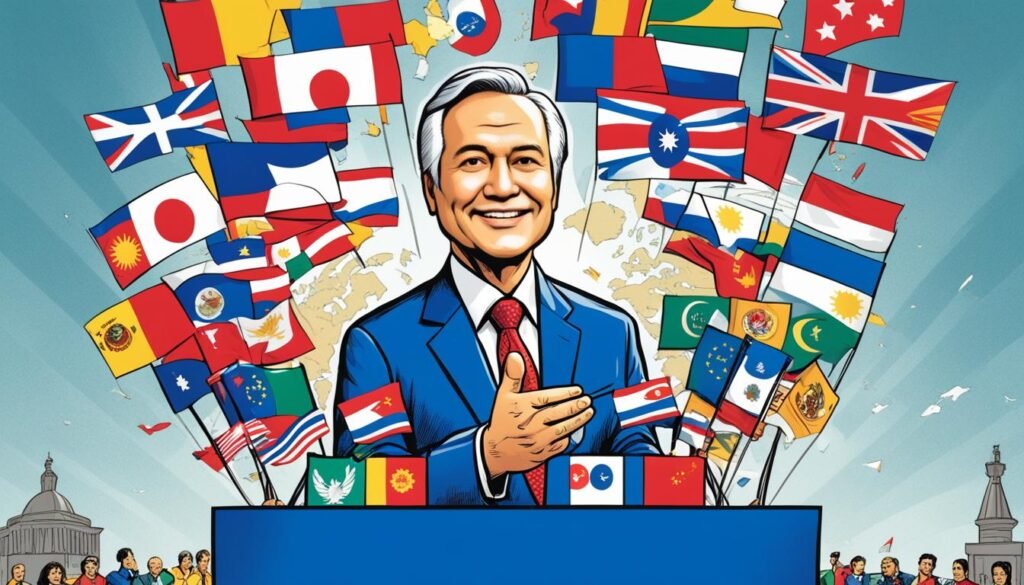
Macapagal’s efforts in foreign relations and diplomacy laid the groundwork for future administrations, showcasing the Philippines as a responsible member of the global community. His diplomatic achievements helped shape the country’s international standing and fostered a sense of pride and unity among Filipinos.
Confrontation with the Nacionalista Dominated Congress
Diosdado Macapagal faced significant challenges during his presidency due to a Congress that was dominated by the rival Nacionalista Party. The dynamics between Macapagal’s progressive agenda and the opposing party often resulted in intense confrontations and political maneuvering.
Despite facing resistance and obstacles, Macapagal remained steadfast in his commitment to implementing reforms and pushing his legislative initiatives forward. He navigated the complexities of a divided Congress, engaging in strategic negotiations and coalition building to advance his agenda.
The confrontation with the Nacionalista Party not only highlighted the ideological differences between Macapagal’s administration and the opposition but also underscored the competing visions for the future of the Philippines. It was a time of intense political polarization and maneuvering, as both sides sought to shape the direction of the nation.
Macapagal’s confrontations with Congress exposed the challenges of enacting progressive policies in an environment characterized by political resistance. Despite these obstacles, he persistently advocated for his ideals and sought to create meaningful change for the Filipino people.
Electoral Defeat and Political Aftermath
In the 1965 presidential election, Diosdado Macapagal faced electoral defeat against Ferdinand Marcos. This defeat marked a turning point in Macapagal’s political career and set the stage for the political aftermath that would follow.
The 1965 Presidential Election
The 1965 presidential election was a highly contested race between Diosdado Macapagal and Ferdinand Marcos. Despite his previous accomplishments as president, Macapagal failed to secure re-election and experienced a significant electoral defeat. Marcos emerged as the victor, beginning his own controversial presidency.
From Presidency to Opposition
After his presidency, Diosdado Macapagal transitioned into the role of an opposition figure. He used this platform to continue advocating for his political ideals and principles, opposing the policies and actions of the incumbent administration.
The 1970 Constitutional Convention and Questioning its Legitimacy
Diosdado Macapagal played a significant role in the 1970 Constitutional Convention. As its head, he oversaw the drafting of the constitution, but later on, questioned its legitimacy and validity due to the manner it was ratified and modified.
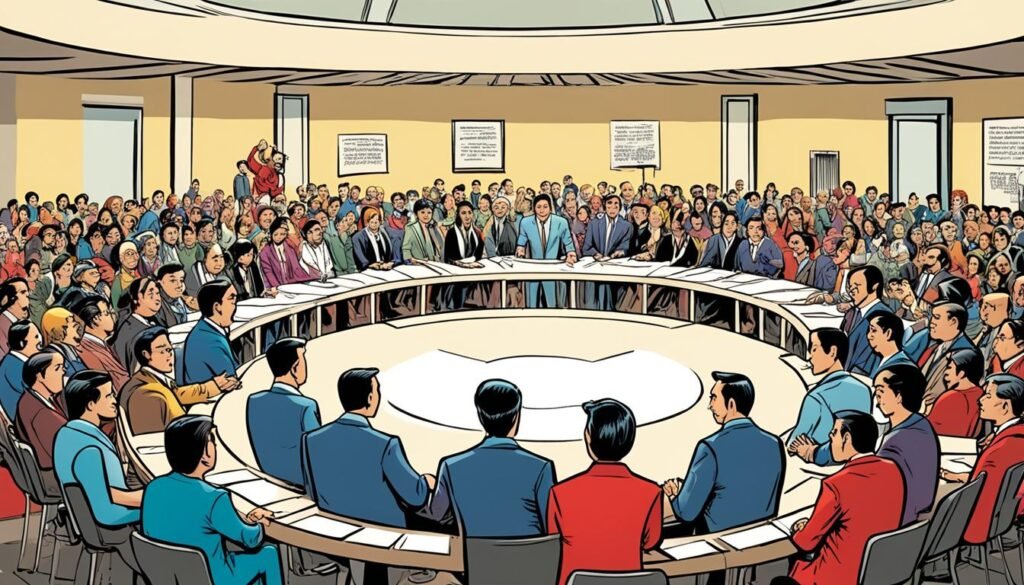
Cultural Contributions: Diosdado Macapagal as a Poet
Aside from his distinguished political career, Diosdado Macapagal also showcased his talent for poetry. His poetic works, although overshadowed by his political biography, made significant contributions to the rich cultural landscape of the Philippines.
In his poetry, Macapagal eloquently expressed his thoughts, emotions, and observations, using vivid imagery and thoughtful words. Through his verses, he delved into various themes, including love, nature, and the struggles of everyday life. His poetic voice resonated with many Filipinos, providing them with insights and reflections that touched their hearts and souls.
“Poetry is the soul’s painting; it paints the emotions of the individual like the art of life.”
Macapagal’s poetry not only demonstrated his artistic prowess but also portrayed his deep understanding of the human experience. Through his words, he shared his perspectives and sparked contemplation among his readers. His poems were a testament to his creativity and intellect, showcasing his ability to communicate profound ideas in a concise yet impactful manner.
While much attention has been given to his political achievements, it is essential to recognize Diosdado Macapagal as a poet who enriched Philippine literature. His poetic contributions offer a unique glimpse into his inner world and add another layer of complexity to his multifaceted persona.
By exploring the cultural contributions of Diosdado Macapagal, we gain a deeper appreciation for the breadth of his talents and the lasting legacy he left behind.
| Key Themes in Macapagal’s Poetry | Notable Poetic Works |
|---|---|
| Nature and its beauty | Ang Ruhon Sa Kalasangan (The Soul in the Forest) |
| Love and heartache | Sa Dakong Silangan (In the Far East) |
| Struggles of the common people | Mga Kadyetong Tumalon (Jumping Lizards) |
| Social and political commentary | Putik Sa Kagiliran (Mud on the Sidelines) |
Final Years and Death
Diosdado Macapagal’s final years were marked by his remarkable legacy, which continues to shape the Philippines to this day. His untimely death on April 21, 1997, left a void in the political landscape and a profound sense of loss among the Filipino people. Despite his departure, his contributions and influence have endured, and his memory lives on through various memorials and the continuation of his political dynasty.
Legacies and Memorials
Diosdado Macapagal’s legacies encompass a wide range of achievements, from his economic reforms and land reform initiatives to his pivotal decision to shift the country’s Independence Day from July 4 to June 12. These accomplishments have had a lasting impact on Philippine society and continue to shape the nation’s development and progress.
To honor his memory and contributions, numerous memorials have been established throughout the country. These include the Diosdado Macapagal Memorial School in Mabalacat, Pampanga, which serves as a testament to his dedication to education. Additionally, the Diosdado Macapagal Bridge in Malolos, Bulacan, stands as a symbol of his efforts to improve infrastructure and connectivity in the Philippines.
Continuation of a Political Dynasty
Diosdado Macapagal’s political dynasty lives on through his daughter, Gloria Macapagal Arroyo. Following in her father’s footsteps, Gloria Macapagal Arroyo served as the 14th President of the Philippines from 2001 to 2010. Her presidency showcased the enduring influence of the Macapagal family in Philippine politics and their commitment to public service.
Conclusion
In evaluating Diosdado Macapagal’s presidency, it becomes evident that his leadership had a profound impact on Philippine society and politics. Throughout his tenure, Macapagal implemented key policies and reforms that aimed to bring about positive change and address pressing issues faced by the nation.
One of his major accomplishments was his introduction of economic reforms that sought to stimulate growth and development. Through his land reform initiatives, Macapagal aimed to address social inequality and improve the lives of the Filipino people. Moreover, his decision to shift the country’s Independence Day from July 4 to June 12 served as a pivotal moment in celebrating the nation’s sovereignty and historical significance.
Macapagal’s presidency was also marked by his commitment to tackling graft and corruption. He implemented measures to promote transparency in government and combat corrupt practices, demonstrating his dedication to upholding integrity and accountability.
Overall, Diosdado Macapagal’s enduring influence on Philippine society and politics is undeniable. His progressive policies, commitment to social justice, and dedication to national development have left an indelible mark on the history of the Philippines.


